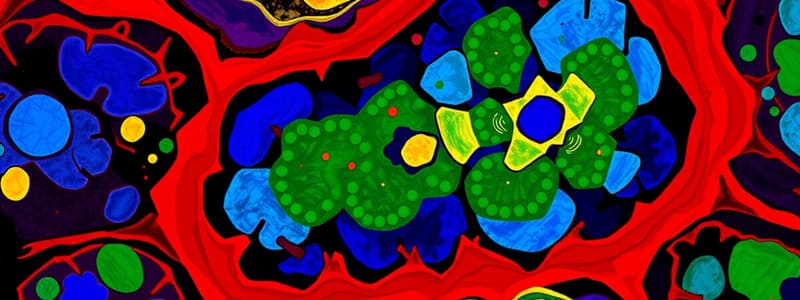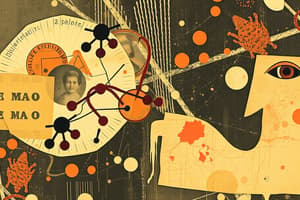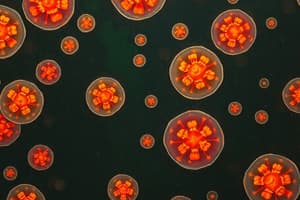Podcast
Questions and Answers
What are the peptides presented by MHC class II peptide molecules?
What are the peptides presented by MHC class II peptide molecules?
- Exogenous antigens (correct)
- Endogenous antigens
- Pathogen antigens
- Cytotoxic antigens
In opsonization with IgG, why is it important that IgG react with the antigen before a phagocytic cell recognizes the antibody?
In opsonization with IgG, why is it important that IgG react with the antigen before a phagocytic cell recognizes the antibody?
If the IgG is bound to the phagocyte before opsonization, it would be ingested by the phagocyte before it could bind to a pathogen.
Which class of antibody accounts for most of the circulating antibodies?
Which class of antibody accounts for most of the circulating antibodies?
IgG
T-independent antigens can activate B cells directly.
T-independent antigens can activate B cells directly.
What is the function of the secretory component of the IgA molecule?
What is the function of the secretory component of the IgA molecule?
Where are T cells and B cells produced?
Where are T cells and B cells produced?
What are cytotoxic T cells primarily responsible for?
What are cytotoxic T cells primarily responsible for?
What happens when a helper T cell is activated?
What happens when a helper T cell is activated?
Which of the following antibodies is a pentamer?
Which of the following antibodies is a pentamer?
How is a T cell receptor different from a B cell receptor?
How is a T cell receptor different from a B cell receptor?
Which of the following is not typical of an antigen?
Which of the following is not typical of an antigen?
Each class of antibody is specifically defined by its:
Each class of antibody is specifically defined by its:
Which of the following do not induce a strong immune response?
Which of the following do not induce a strong immune response?
The immunoglobulin monomer consists of:
The immunoglobulin monomer consists of:
What are CD8 cells?
What are CD8 cells?
Please select the correct statement regarding MHC molecules.
Please select the correct statement regarding MHC molecules.
Why would a person who has their tonsils removed be more susceptible to certain infections?
Why would a person who has their tonsils removed be more susceptible to certain infections?
Class II MHC molecules are found primarily on:
Class II MHC molecules are found primarily on:
All antigens are immunogens.
All antigens are immunogens.
The only class of antibody that can cross the placenta is:
The only class of antibody that can cross the placenta is:
The surface receptors on B and T cells both:
The surface receptors on B and T cells both:
Which is the most efficient at initiating the classical pathway of the complement cascade?
Which is the most efficient at initiating the classical pathway of the complement cascade?
Only antigen-presenting cells produce MHC class II molecules.
Only antigen-presenting cells produce MHC class II molecules.
The immune response is directed against an entire molecule.
The immune response is directed against an entire molecule.
The chains of an antibody molecule are bonded to one another by:
The chains of an antibody molecule are bonded to one another by:
According to clonal selection theory:
According to clonal selection theory:
Proteins that react specifically with the chemical structures in the antigen that induced them are called:
Proteins that react specifically with the chemical structures in the antigen that induced them are called:
Where do T cells mature?
Where do T cells mature?
What are giant cells used for?
What are giant cells used for?
The immunoglobulin that is important in hypersensitivity reactions is:
The immunoglobulin that is important in hypersensitivity reactions is:
Which is the first antibody class made during the primary response to an antigen?
Which is the first antibody class made during the primary response to an antigen?
Identify the roles of natural killer cells.
Identify the roles of natural killer cells.
What is the definition of clonal selection?
What is the definition of clonal selection?
Which of the following is the most abundant immunological class produced?
Which of the following is the most abundant immunological class produced?
How long after initiation of a primary response do significant amounts of antibody appear in the blood?
How long after initiation of a primary response do significant amounts of antibody appear in the blood?
Ag-Ab binding may result in all of the following EXCEPT:
Ag-Ab binding may result in all of the following EXCEPT:
Perforin is produced by:
Perforin is produced by:
Who received the Nobel Peace Prize in Medicine for his work on antibody therapy?
Who received the Nobel Peace Prize in Medicine for his work on antibody therapy?
If a denatured antigen were analyzed, would it be expected to have the same epitopes as its native counterpart?
If a denatured antigen were analyzed, would it be expected to have the same epitopes as its native counterpart?
What is the term synonymous with antibody?
What is the term synonymous with antibody?
The characteristic function and properties of each class of antibody are determined by the:
The characteristic function and properties of each class of antibody are determined by the:
How is the central portion of a T cell receptor complex functionally analogous to the center of the B cell receptor complex?
How is the central portion of a T cell receptor complex functionally analogous to the center of the B cell receptor complex?
Antibody and antigen are held to one another by covalent bonds.
Antibody and antigen are held to one another by covalent bonds.
An IgG molecule has two:
An IgG molecule has two:
What do 'clonal selection' and 'clonal expansion' refer to?
What do 'clonal selection' and 'clonal expansion' refer to?
It would be useful if antigens were delivered directly to:
It would be useful if antigens were delivered directly to:
The cells that actually secrete antibodies are:
The cells that actually secrete antibodies are:
What would be an appropriate response if an antigen is presented on MHC class II molecules?
What would be an appropriate response if an antigen is presented on MHC class II molecules?
Epitopes or antigenic determinants are:
Epitopes or antigenic determinants are:
Each class of antibody is specifically defined by its:
Each class of antibody is specifically defined by its:
CD4 cells are also known as:
CD4 cells are also known as:
Which of the following does NOT form a memory population after activation and differentiation?
Which of the following does NOT form a memory population after activation and differentiation?
The variable region of an antibody occurs:
The variable region of an antibody occurs:
The immunoglobulin monomer consists of:
The immunoglobulin monomer consists of:
A scientist isolated a new blood-borne virus that shuts down MHC presentation. Why was the warning about its destructibility questioned?
A scientist isolated a new blood-borne virus that shuts down MHC presentation. Why was the warning about its destructibility questioned?
Which of the following antibodies is a dimer?
Which of the following antibodies is a dimer?
Please select the correct statement regarding MHC molecules.
Please select the correct statement regarding MHC molecules.
Gene rearrangement is responsible for the generation of the various antibody molecules.
Gene rearrangement is responsible for the generation of the various antibody molecules.
Antigens interact with antibodies at:
Antigens interact with antibodies at:
There are __________ classes of antibodies.
There are __________ classes of antibodies.
The Fc region on IgG:
The Fc region on IgG:
What do secondary lymphoid organs facilitate?
What do secondary lymphoid organs facilitate?
All antigens are immunogens.
All antigens are immunogens.
Microphages and dendritic cells are:
Microphages and dendritic cells are:
Specific regions on an antigen molecule to which the immune response is directed are called:
Specific regions on an antigen molecule to which the immune response is directed are called:
How is a T-cell receptor different from a B-cell receptor?
How is a T-cell receptor different from a B-cell receptor?
Which of the following are antigen-presenting cell(s)?
Which of the following are antigen-presenting cell(s)?
Flashcards are hidden until you start studying
Study Notes
Antigen Presentation and Activation
- Peptides presented by MHC class II molecules originate from exogenous antigens.
- Helper T cells recognize antigens presented on MHC class II molecules, activating immune responses.
- Activation of T helper cells results in memory Th cells and effector Th cells, which further activate B cells.
Antibody Classes and Functions
- IgG is the most abundant class of circulating antibodies and can cross the placenta.
- IgM is a pentamer and is the first antibody produced during primary immune response.
- IgA is a dimer important in mucosal immunity.
- IgE is involved in hypersensitivity reactions.
Immune Cell Production and Function
- T cells and B cells are produced in the bone marrow; T cells mature in the thymus.
- Cytotoxic T cells (CD8 cells) are responsible for cell-mediated immunity, targeting infected cells.
- Plasma cells are the specific cells that secrete antibodies.
- Natural killer (NK) cells play roles in antibody-dependent cellular cytotoxicity and negative selection of lymphocytes.
Antigen Properties and Immune Response
- Not all antigens are strong immunogens; low molecular weight substances like lipids and simple sugars do not induce robust responses.
- Antigens interact with antibodies at the outer ends of the antibody's Y-structure; these sites are known as epitopes or antigenic determinants.
- Clonal selection occurs when a lymphocyte's antigen receptor binds to an antigen, prompting the cell to proliferate.
Cellular Immunology
- Giant cells contain bacterial infections through a process of aggregation and encapsulation.
- Monomeric antibodies consist of two heavy and two light chains linked by disulfide bonds.
- CD4 cells (T helper cells) play a critical role in activating the immune response through helper functions.
Mechanisms of Action
- Opsonization involves antibodies like IgG coating pathogens to enhance phagocytosis by phagocytes.
- Complement activation can be initiated most effectively by IgM, leading to pathogen lysis.
Memory and Response Duration
- Memory populations are formed by activated B cells and T cells, allowing for quicker responses upon re-exposure to antigens.
- Significant antibody levels appear in the blood within 10-14 days following primary response initiation.
Antigen Prerequisites and Recognition
- Antigen-presenting cells, including macrophages and dendritic cells, express MHC class II molecules and facilitate T-cell activation.
- The FC region of IgG interacts with complement proteins and receptors on macrophages, promoting immune clearance.
Infants and Pathogen Defense
- Removal of tonsils can increase susceptibility to respiratory infections due to loss of these secondary lymphoid organs which monitor oral cavity microbes.
Miscellaneous
- Gene rearrangement allows for the diversity of antibody molecules.
- Antigenic determinants are specific regions targeted by immune responses, and covalent bonds do not exist between antibodies and antigens.
Scientific Milestones
- Emil von Behring received the Nobel Prize for his contributions to antibody therapy, demonstrating the medical importance of immunology.
Studying That Suits You
Use AI to generate personalized quizzes and flashcards to suit your learning preferences.




